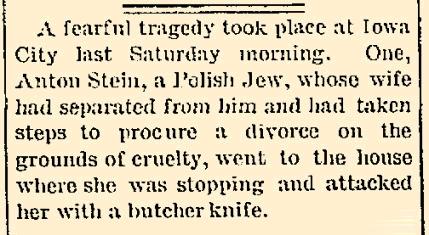Posted by Candice on Tuesday, Apr 10, 2018
 And I do mean a good old walk!
And I do mean a good old walk!
On November 5, 1881, Anton Stein woke up, had coffee in the guest house he was at on Dubuque St., then went and murdered his wife. In between those disparate acts, he made a couple stops. On his walk, he would have gone past some buildings that are no longer there, while others we still see today; he visited businesses that are long gone, but their owners and functions left their mark on our downtown. He would have passed by the many people who were making their way in an Iowa City that was barely forty years old, hard-scrabble and burgeoning at the same time.
Using various local history resources that the Library has and provides access to, we've been able to recreate the short walk that Anton Stein took. We've also filled in the story of what happened to the people involved, and gained an idea of what our city looked like at that time. Want to learn more? Join us for an ICPL History Walk: The Lizzie Hess Murder, on Saturday, May 5. There are walks scheduled at 2:30 and 7:00 p.m., and registration is required. The walk should last about 1-1.5 hours, and is about one mile total. The 2:30 walk will meet inside the Library lobby, and the 7:00 right outside the lobby in the pedmall.
Register for the 2:30 walk.
Register for the 7:00 walk.
This program is part of ICPL's Weber Days, a series of Local History programs and events honoring the memory and work of Iowa City Historian Irving B. Weber. If you have any questions, please contact Candice Smith at csmith@icpl.org or 319-887-6031


This was an enlightening and uplifting read. The story of jazz-era Detroit, told through the lives of some of its most mesmerizing and affecting Black residents. The book begins with the narrator, Ziggy, recounting what he calls the "Caramel Camelot," the area and world of Detroit where Black families had migrated to, and having found solid employment in the burgeoning auto industry, made their homes in the neighborhoods where they could buy houses and support enterprises (ie, jazz clubs, schools, hospitals, stores, restaurants, etc.) run by their people and for their people. It's a book that shows the reader what once was, what's been lost, and just possibly, what could be again. -Candice